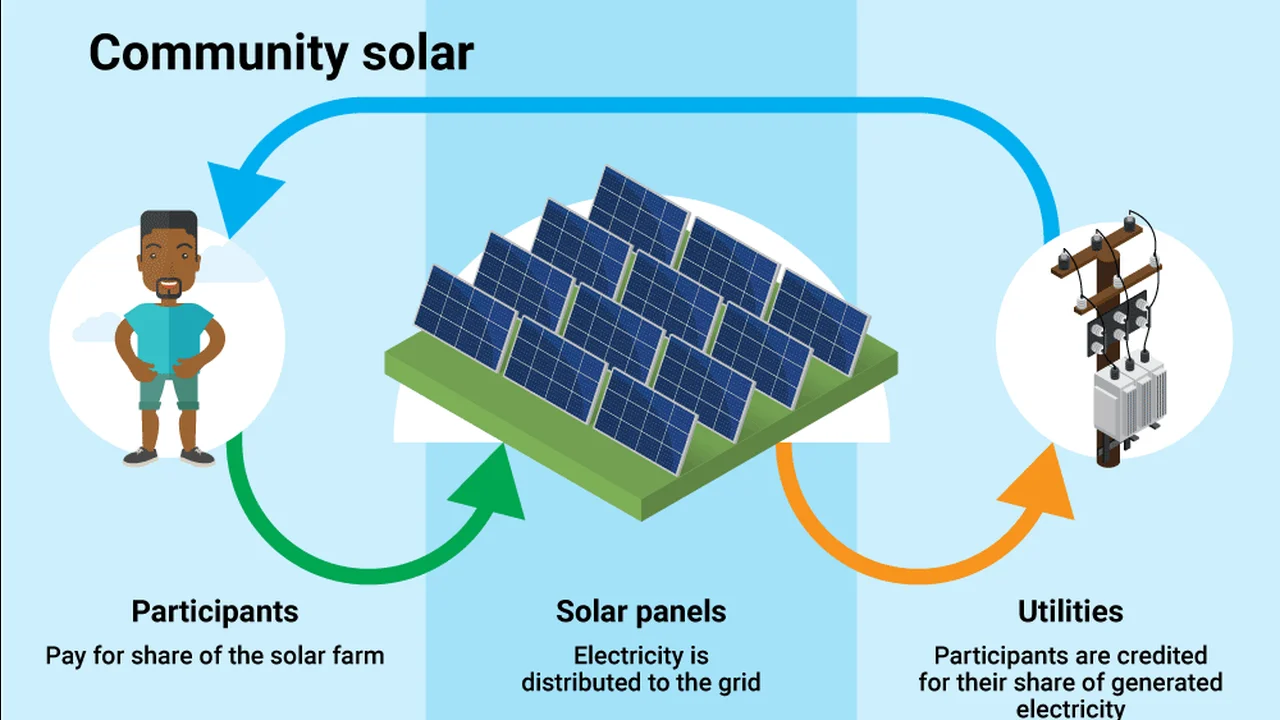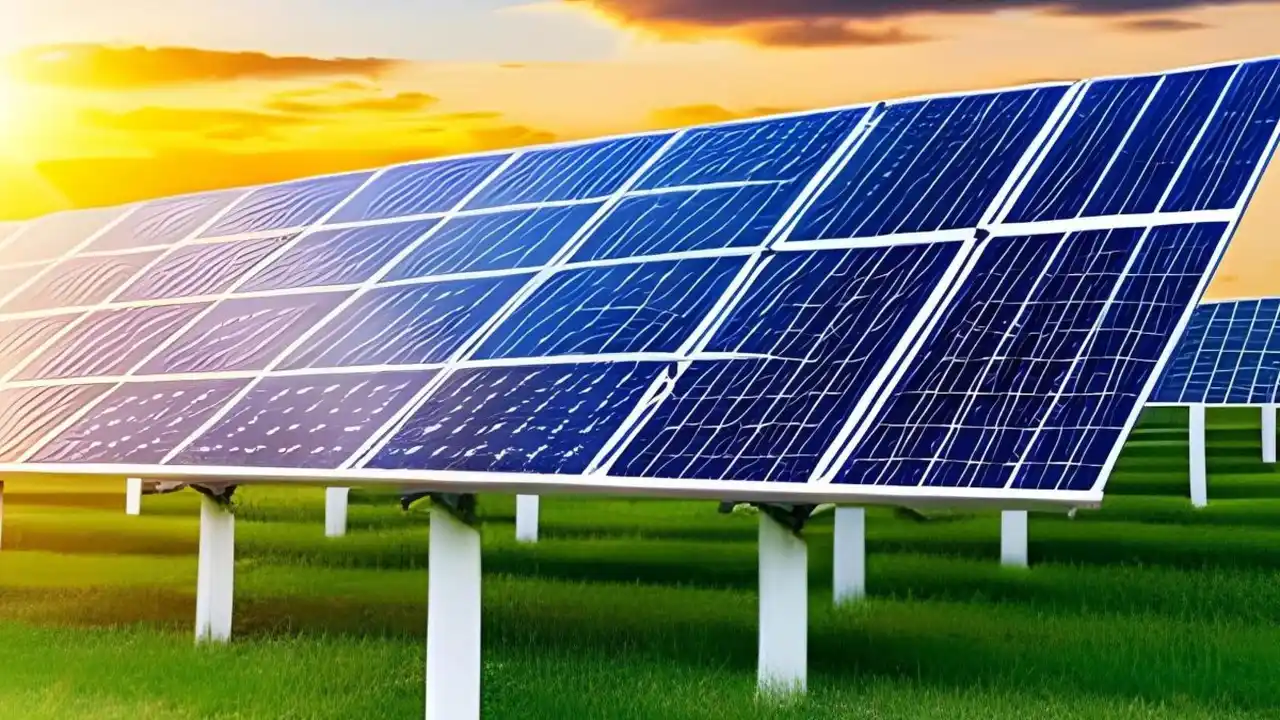Solar Panel and Community Solar: Sharing the Benefits

Understanding Community Solar A Cost Effective Energy Solution
Hey there! Let's talk about community solar. You might be thinking, "Solar panels? Isn't that just for rich folks with big roofs?" Not anymore! Community solar is changing the game, making solar power accessible to renters, apartment dwellers, and anyone whose roof isn't ideal for individual solar panels. Think of it as a shared solar farm, where you subscribe to a portion of the energy produced and get credits on your electricity bill. Pretty cool, right?
So, how does it work? Basically, a large solar array is built in a sunny location. Then, people like you and me can subscribe to a portion of that array. The electricity generated is fed into the grid, and you receive credits on your electricity bill based on your share of the solar farm's production. It's like having your own solar panels without the hassle of installation, maintenance, or upfront costs.
The Financial Advantages of Community Solar Cost Savings Explained
Alright, let's get down to brass tacks: money! How does community solar actually save you money? Well, it's all about those bill credits. Because you're subscribing to a portion of a solar farm, you're essentially generating your own electricity, even if it's happening miles away. This means you're relying less on the traditional grid, which translates to lower electricity bills.
The exact savings will vary depending on your location, the size of your subscription, and the electricity rates in your area. However, many community solar subscribers see savings of 5-15% on their electricity bills. That might not sound like a ton, but it adds up over time! Plus, many community solar programs offer fixed rates, so you can protect yourself from rising electricity costs in the future.
Another financial benefit is the lack of upfront investment. Individual solar panels can cost tens of thousands of dollars to install. With community solar, there's usually no upfront cost or a very small subscription fee. This makes it a much more accessible option for people who can't afford the initial investment of traditional solar.
Environmental Impact of Community Solar Reducing Your Carbon Footprint
Beyond the financial benefits, community solar is also a great way to reduce your carbon footprint. By subscribing to a solar farm, you're supporting renewable energy and helping to reduce reliance on fossil fuels. This contributes to a cleaner environment and a more sustainable future.
Think about it: traditional electricity generation often involves burning coal or natural gas, which releases harmful pollutants into the atmosphere. Solar power, on the other hand, is a clean, renewable energy source that doesn't produce greenhouse gases. By choosing community solar, you're making a conscious decision to support a cleaner energy future.
Even if you're already conscious about your environmental impact, community solar can be an easy way to do even more. You don't have to change your lifestyle or invest in expensive equipment. Simply subscribe to a community solar farm and start making a difference.
Community Solar Programs Availability and Accessibility Nationwide
Okay, so you're convinced that community solar is awesome. But is it available in your area? Fortunately, community solar programs are becoming increasingly common across the United States. Many states have policies in place to support community solar development, and more and more projects are popping up all the time.
To find community solar programs in your area, you can start by searching online. There are several websites and organizations that list community solar projects and providers. You can also contact your local utility company to see if they offer community solar options.
When researching community solar programs, be sure to compare the terms and conditions carefully. Look for programs with transparent pricing, flexible subscription options, and clear cancellation policies. You should also check the reputation of the provider and make sure they have a good track record.
Comparing Different Community Solar Providers Features Pricing and Reviews
So you've found a few community solar providers in your area. Now what? It's time to compare them and choose the one that's right for you. Here are a few things to consider:
* **Pricing:** How much does it cost to subscribe to the solar farm? Are there any upfront fees? What's the rate you'll receive for your solar credits? * **Subscription options:** How much of the solar farm can you subscribe to? Can you adjust your subscription size later if your energy needs change? * **Contract terms:** How long is the contract? What happens if you move? Can you cancel your subscription without penalty? * **Reputation:** What do other customers say about the provider? Are they responsive to questions and concerns? Do they have a good track record of delivering on their promises? * **Environmental impact:** Is the solar farm located nearby? What is the provider doing to support local communities and protect the environment?Don't be afraid to ask questions and do your research. The more information you have, the better equipped you'll be to make an informed decision.
The Future of Community Solar Growth and Innovation in Renewable Energy
Community solar is still a relatively new concept, but it's growing rapidly. As more and more people become aware of the benefits of community solar, demand is expected to increase. This will drive innovation and lead to even more affordable and accessible solar options in the future.
One exciting trend is the development of community solar projects that are paired with energy storage. This allows solar energy to be stored and used even when the sun isn't shining, making it a more reliable and consistent source of power. Another trend is the integration of community solar with smart grid technologies, which can help to optimize energy distribution and reduce waste.
As technology advances and costs continue to decline, community solar is poised to play an increasingly important role in the transition to a clean energy future.
Specific Solar Panel Product Recommendations for Home Use
While community solar is great, maybe you *do* have a good roof and want to explore owning your own panels. Here are a few recommendations, keeping in mind that prices fluctuate and installation costs are separate:
LG NeON 2 Black Solar Panels High Efficiency Option
LG panels are known for their high efficiency and sleek design. The NeON 2 Black series is a popular choice for homeowners who want the best possible performance. They typically offer a power output of around 380-400 watts per panel. Expect to pay around $300-$400 per panel, excluding installation.
Use Case: Ideal for homes with limited roof space or those who want to maximize energy production. Great for areas with consistent sunshine.
Panasonic EverVolt Solar Panels Reliable and Durable Choice
Panasonic panels are another excellent option, known for their reliability and durability. The EverVolt series offers a good balance of performance and affordability. They typically offer a power output of around 360-380 watts per panel. Expect to pay around $280-$380 per panel, excluding installation.
Use Case: A good all-around choice for homeowners who want a reliable and long-lasting solar system. Suitable for various climates.
REC Alpha Series Solar Panels High Power Output Option
REC panels are known for their high power output and innovative design. The Alpha series is a premium option that offers excellent performance. They typically offer a power output of around 400-450 watts per panel. Expect to pay around $350-$450 per panel, excluding installation.
Use Case: Best for homes with high energy consumption or those who want to generate as much electricity as possible. Suitable for larger homes.
Comparing Solar Panel Brands LG Panasonic and REC
Let's break down the differences between these three popular brands:
* **LG:** Known for premium efficiency and aesthetics. Often a bit more expensive. * **Panasonic:** Strong reputation for reliability and long-term performance. A good mid-range option. * **REC:** Focuses on high power output and innovative technology. A good choice for maximizing energy production.When choosing a solar panel brand, consider your budget, energy needs, and aesthetic preferences. It's also a good idea to get quotes from multiple installers to compare prices and options.
Solar Panel Installation Considerations DIY vs Professional
Thinking about installing your own solar panels? While it's possible, it's generally recommended to hire a professional installer. Solar panel installation involves working with electricity and heights, which can be dangerous if you're not experienced. A professional installer will also ensure that your system is properly designed and installed to maximize its performance and safety.
However, if you're a handy person with electrical experience, you might be able to tackle a small DIY solar project, such as installing solar panels on a shed or RV. Just be sure to do your research, follow all safety precautions, and obtain any necessary permits.
Solar Panel Costs Factors Affecting Price and Investment
The cost of solar panels can vary depending on several factors, including:
* **Panel brand and model:** Premium panels tend to be more expensive. * **System size:** Larger systems cost more. * **Installation costs:** These can vary depending on the complexity of the installation. * **Incentives and rebates:** Government incentives can significantly reduce the cost of solar panels. * **Location:** Solar panel costs can vary depending on your location.To get an accurate estimate of the cost of solar panels, it's best to get quotes from multiple installers. Be sure to ask about all costs, including equipment, labor, permits, and inspections.
Solar Panel Maintenance Tips Ensuring Longevity and Performance
Once your solar panels are installed, it's important to maintain them properly to ensure their longevity and performance. Here are a few tips:
* **Keep them clean:** Regularly clean your solar panels to remove dirt, dust, and debris. * **Monitor performance:** Check your system's performance regularly to identify any issues. * **Trim trees:** Trim any trees that might be shading your solar panels. * **Inspect wiring:** Regularly inspect the wiring for any damage or wear. * **Schedule professional maintenance:** Schedule regular maintenance checks with a qualified solar technician.With proper maintenance, your solar panels can last for 25 years or more, providing you with clean, renewable energy for decades to come.
:max_bytes(150000):strip_icc()/277019-baked-pork-chops-with-cream-of-mushroom-soup-DDMFS-beauty-4x3-BG-7505-5762b731cf30447d9cbbbbbf387beafa.jpg)




